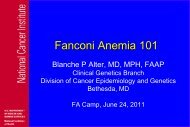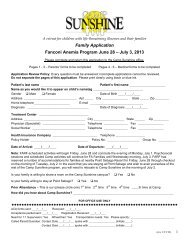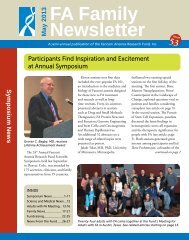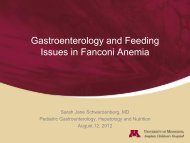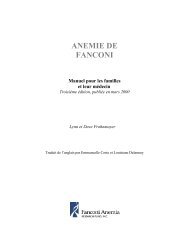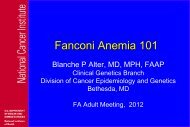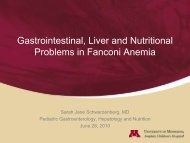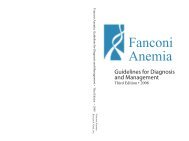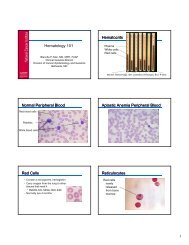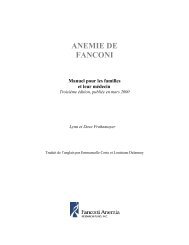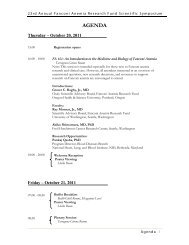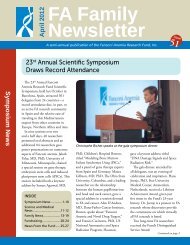FA Family Newsletter - Fanconi Anemia Research Fund
FA Family Newsletter - Fanconi Anemia Research Fund
FA Family Newsletter - Fanconi Anemia Research Fund
- No tags were found...
You also want an ePaper? Increase the reach of your titles
YUMPU automatically turns print PDFs into web optimized ePapers that Google loves.
Psychological/Social Issues Affect FamiliesDuring TransplantationJulia Kearney, MD,Memorial Sloan-KetteringCancer Center (MSKCC),New York, remindedfamilies facing a stem celltransplant (SCT) that the“family is the patient” andto remember that “you arenot crazy, what you aregoing through is crazy!”She gave a comprehensivepresentation on social, educational and psychologicalconsiderations before, during and after SCT.Prior to SCT, <strong>Fanconi</strong> anemia families and patientsoften seem more distressed than non-<strong>FA</strong> families, soMSKCC conducted a study to investigate psychiatricissues in families with <strong>FA</strong>. Fear of future cancers,congenital malformations, neurologic issues, multipleaffected children, effects of androgen use and infertilityissues can contribute to psychological issues and increasea family’s stress level.Goals of a pre-transplant psychiatric consultation are toaddress current problems, identify medical stressors anddevelop a symptom management plan. Families shouldidentify personal and professional sources of support.Children need preparation for what lies ahead. Honest,age-appropriate discussion with parents and helpingprofessionals, books, role-playing medical procedures,and games that help children understand medical issuescan be helpful.At MSKCC, a multidisciplinary psychosocial teamhelps with issues as they arise throughout the transplant.It’s useful to create a routine by posting goals for eachday. Psychiatric symptoms such as depression and anxietycause suffering and should be treated.Dr. Kearney identified the challenges that awaitfamilies post-transplant. These include coping withan extremely complex medication schedule, caregiverburnout, and emotional/behavioral issues. Maintainingcontact with peers during transplant (through Skype,for example) can help with re-entry to school and peercontact post-transplant. <strong>FA</strong> survivors and their familiesneed to understand the importance of adhering tomedical advice and follow-up screening, and to avoidbehaviors that could risk future health.Making a Personal Connection to <strong>FA</strong> <strong>Research</strong>Several researchers attended the <strong>FA</strong> <strong>Family</strong> Meeting atCamp Sunshine to gather tissue or saliva samples to helpfurther their <strong>Fanconi</strong> anemia research. Eunike Velleuer,MD, Heinrich Heine University, Children’s Hospital,Düsseldorf, Germany, took oral brush samples from <strong>FA</strong>patients as a means of detecting early-stage head andneck cancer. Flavia Teles, DDS, MS, DMSc, The ForsythInstitute, Cambridge, took saliva samples for her studyon microbial markers of oral cancer; and Melinda ButschKovacic, MPH, PhD, Cincinnati Children’s HospitalMedical Center, Cincinnati, collected saliva samples forher work on human papilloma virus (HPV) in peoplewith <strong>FA</strong>.In-depth information about families affected by <strong>FA</strong>was collected by the research team of Blanche Alter,MD, and Lisa Leathwood, RN, from the NationalCancer Institute in Rockville, Md. Dr. Alter andLeathwood took advantage of the high number of newfamilies at Camp this year (14!) to encourage enrollmentin the Inherited Bone Marrow Failure SyndromesCohort Study.We know from past meeting evaluations that familiesappreciate the presence of researchers at Camp andclearly understand that their participation in the projectscan significantly contribute to the body of knowledgeabout <strong>FA</strong>. Likewise, the researchers always expressgratitude for the opportunity to meet directly withfamilies and acquire such precious samples. Thanks toboth the families and researchers for their efforts to move<strong>FA</strong> research forward!Science News From the <strong>Family</strong> Meeting<strong>Family</strong> <strong>Newsletter</strong> #50 7



